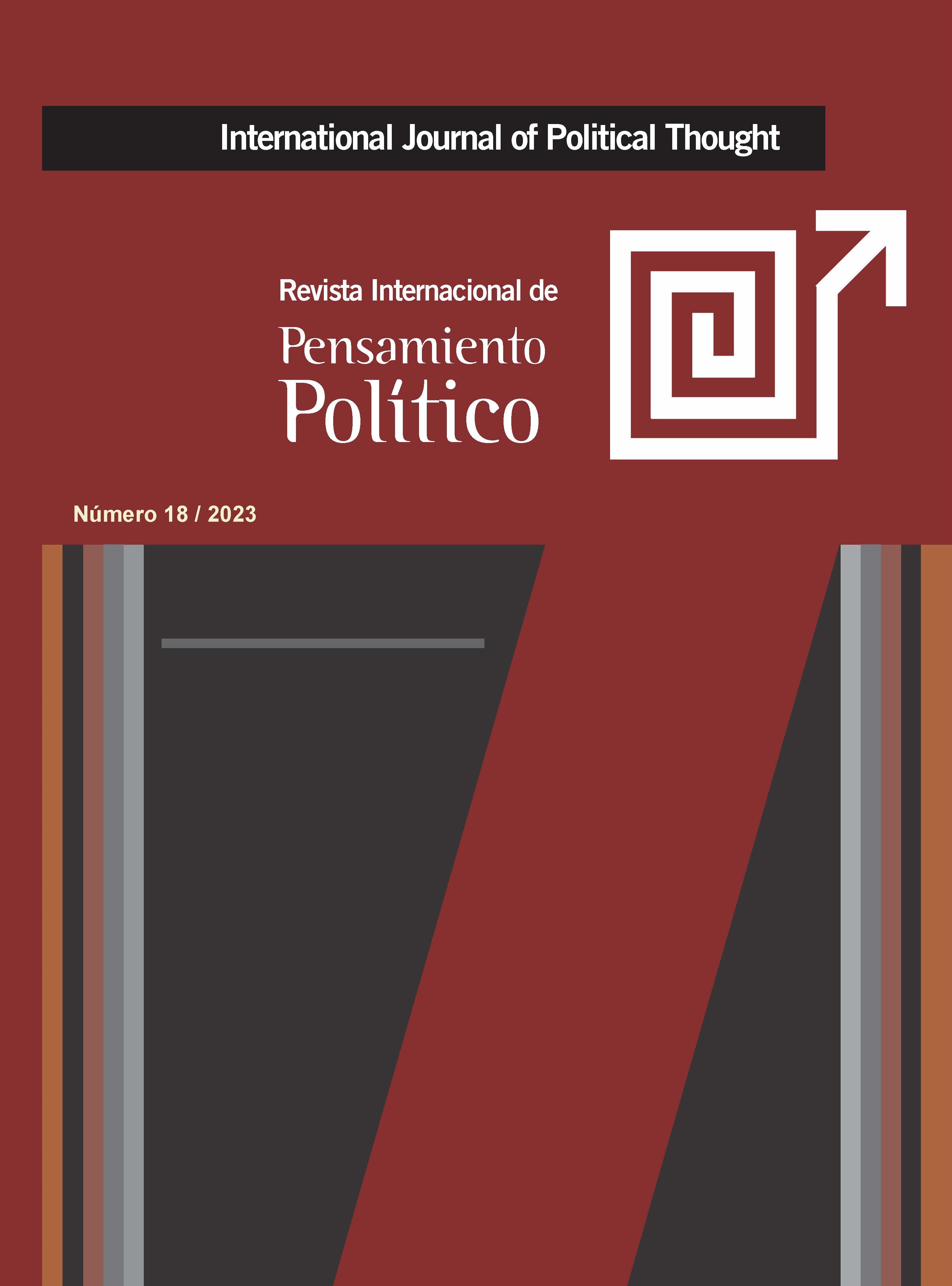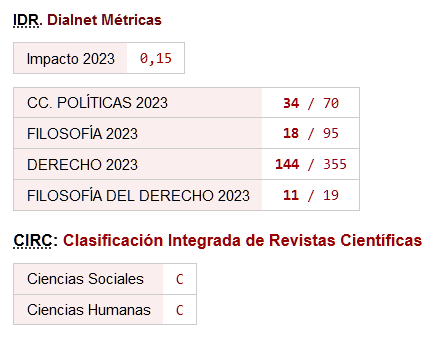Tarantino
Revenge or justice
DOI:
https://doi.org/10.46661/revintpensampolit.8531Keywords:
Tarantino, violence, revenge, justiceAbstract
Tarantino's movies constantly resort to violence, but they do so taking into account certain elements that justify it in spectator’s gaze. Although his protagonists use violence, they assume that they must limit it as recommended by legitimate self-defense or deserved revenge, as opposed to its indiscriminate use by the antagonists. Since reality is unpleasant, Tarantino rewrites history as the avenging God who imposes his justice on the world. To make this possible, violence appears as an instrument that builds a new reality that redeems those who deserve it.
Downloads
References
Alfieri, A. (2018). Dal simulacro alla Storia. Estetica ed etica in Quentin Tarantino. Pistoia: Editrice Petite Plaisance.
Anderson, A.C. (2007). "Stuntman Mike, Simulation, and Sadism in Death Proof", en R. Greene y K.S. Mohammad (ed.). Quentin Tarantino and Philosophy. How to Philosophize with a Pair of Pliers and a Blowtorch. Chicago and La Salle: Open Court, pp. 13-20.
Bull, H. (2005). La sociedad anárquica. Un estudio sobre el orden en la política mundial. Madrid: Los libros de la Catarata.
Cairo, H.; Franzé, J. (2010). "Política y cultura: ¿tensión entre dos lenguajes? La gobernanza cultural", en H. Cairo; J. Franzé (comps.). Política y cultura. La tensión de dos lenguajes. Madrid: Biblioteca nueva, pp. 13-23.
Cicerón, M.T. (2017). La república. Las leyes. Madrid: Ediciones Akal.
Cioffi, A.E. (2022). Philosophical Theories of Political Cinema. London and New York: Routledge. https://doi.org/10.4324/9780367816872 DOI: https://doi.org/10.4324/9780367816872
Cuddy, L.; Bruce, M. (2007). "Could Beatrix Kiddo Reach Enlightenment? Traces of Buddhist Philosophy in Kill Bill", en Greene y Mohammad (ed.). Quentin Tarantino and Philosophy, op. cit., pp. 189-201
Fernández de la Peña, M. (2022). "La relevancia de la historia de los conceptos koselleckiana en la teoría política contemporánea. A propósito de la publicación de Ilustración, progreso, modernidad", Éndoxa: Series Filosóficas, vol. 49 (2022), pp. 255-268. https://doi.org/10.5944/endoxa.49.2022.31214 DOI: https://doi.org/10.5944/endoxa.49.2022.31214
Fraser, I. (2018). Political Theory and Film. From Adorno to Žižek. London and New York: Rowman & Littlefield International. DOI: https://doi.org/10.5771/9781783481651
Gallafent, E. (2006). Quentin Tarantino. Essex (England): Pearson Education Limited.
Giroux, H.A. (2004). "Pedagogy, Film, and the Responsibility of Intellectuals: A Response". Cinema Journal, vol 43 (2), pp. 119-127. https://doi.org/10.1353/cj.2004.0004 https://www.jstor.org/stable/1225923 DOI: https://doi.org/10.1353/cj.2004.0004
Haas, E.; Haas, P.J.; Christensen, T. (2015). Projecting politics: political messages in American films. London and New York: Routledge. https://doi.org/10.4324/9781315720791 DOI: https://doi.org/10.4324/9781315720791
Harvey, D. (2012). La condición de la posmodernidad: investigación sobre los orígenes del cambio cultural. Traducción de Martha Eguía. Buenos Aires: Amorrortu.
Hobbes, T. (2014). Leviatán. La materia, forma y poder de un estado eclesiástico y civil. Traducción, prólogo y notas de Carlos Mellizo. Madrid: Alianza Editorial. [Leviatán]
Holm, D.K. (2004). Quentin Tarantino. The Pocket Essentials Series. Harpenden (UK): Pocket Essentials.
Iglesias Turrión, P. (2013). Maquiavelo frente a la gran pantalla. Cine y política. Madrid: Akal.
Johnson, D.K. (2007). "Revenge and Mercy in Tarantino: The Lesson of Ezekiel 25:17", en Greene y Mohammad (ed.). Quentin Tarantino and Philosophy, op. cit., pp. 55-73.
Kant, I. (2011). "Sobre un presunto derecho de mentir por filantropía", en I. Kant. Teoría y Práctica. Estudio preliminar de Roberto Rodríguez Aramayo. Madrid: Tecnos, pp. 61-68.
Lyons, S. (2022). "Don't Look Now: Ontologies of Off-Screen Violence", en S. Choe (ed.). The Palgrave Handbook of Violence in Film and Media. Gewerbestrasse (Switzerland): Palgrave Macmillan, pp. 315-330. https://doi.org/10.1007/978-3-031-05390-0_16 DOI: https://doi.org/10.1007/978-3-031-05390-0_16
Maquiavelo, N. (2015). El príncipe. Prólogo, traducción y notas de Miguel Ángel Granada. Madrid: Alianza editorial.
Maquiavelo, N. (2009). Discursos sobre la primera década de Tito Livio. Madrid: Alianza Editorial. https://doi.org/10.7476/9786558461609 DOI: https://doi.org/10.7476/9786558461609
Nama, A. (2015). Race on the QT. Blackness and the Films of Quentin Tarantino. Austin: University of Texas Press.
Nelson, J.S. (2013). Popular Cinema as Political Theory. Idealism and Realism in Epics, Noirs, and Satires. New York: Palgrave Macmillan. https://doi.org/10.1057/9781137373861 DOI: https://doi.org/10.1057/9781137373861
Pagello, F. (2020). Quentin Tarantino and Film Theory. Aesthetics and Dialectics in Late Postmodernity. Gewerbestrasse (Switzerland): Palgrave Macmillan. https://doi.org/10.1007/978-3-030-43819-7 DOI: https://doi.org/10.1007/978-3-030-43819-7
Pocock, J.G.A. (2011). Pensamiento político e historia. Ensayos sobre teoría y método. Madrid: Akal.
Pocock, J.G.A. (2008). El momento maquiavélico. El pensamiento político florentino y la tradición republicana atlántica. Madrid: Tecnos.
Roth, T.D. (2007). "A Sword of Righteousness: Kill Bill and the Ethics of Vengeance", en Greene y Mohammad (ed.). Quentin Tarantino and Philosophy, op. cit., pp. 85-95.
Russell, B. (2007). "Tarantino's Films: What Are They About and What Can We Learn from Them?", en Greene y Mohammad (ed.). Quentin Tarantino and Philosophy, op. cit., pp. 3-12.
Schell, H. (2021). Quentin Tarantino. Cine de reescritura. Edición electrónica: www.articaonline.com. Creative Commons 4.0.
Schmitt, C. (2009). El concepto de lo político. Texto de 1932 con un prólogo y tres corolarios. Versión de Rafael Agapito. Madrid: Alianza editorial.
Schmitt, C. (2002). El nomos de la tierra en el Derecho de Gentes del «Ius publicum europaeum». Traducción de Dora Schilling Thou. Granada: Editorial Comares.
Serrano Álvarez, A. (2014). El cine de Quentin Tarantino. Una aproximación a la estética de la violencia. Caracas: Universidad Católica Andrés Bello.
Shapiro, M.J. (2009). Cinematic Geopolitics. London and New York: Routledge. https://doi.org/10.4324/9780203892008 DOI: https://doi.org/10.4324/9780203892008
Speck, Oliver C. (2014). "Introduction: A Southern State of Exception", en O.C. Speck, (ed). Quentin Tarantino's Django Unchained. The Continuation of Metacinema. New York and London: Bloomsbury Academic, pp. 1-14. https://doi.org/10.5040/9781501300189.ch-001 DOI: https://doi.org/10.5040/9781501300189.ch-001
Spence, J.H. (2007). "The Moral Lives of Reservoir Dogs", en Greene y Mohammad. Quentin Tarantino and Philosophy, op. cit., pp. 43-54
Tarantino, Q. (2023). Meditaciones de cine. Traducción de Carlos Milla Soler. Barcelona: Penguin Random House Grupo Editorial.
Tarantino, Q. (2005). "It's cool to be banned", en P.A. Woods (ed). Quentin Tarantino: the film geek files. London: Plexus, pp. 30-31.
Tucídides (2016). Historia de la Guerra del Peloponeso. Madrid: Ediciones Cátedra.
Weber, Max (2018). La política como profesión. Edición de Joaquín Abellán. Madrid: Biblioteca Nueva.
Wolin, S.S. (2012). Política y perspectiva. Continuidad e innovación en el pensamiento político occidental. México D. F.: Fondo de Cultura Económica,
Yu, C-M. (2022). "Violent Corporeality in Cinema", en Choe (ed.). The Palgrave Handbook of Violence in Film and Media, op. cit. 37-54. https://doi.org/10.1007/978-3-031-05390-0_3 DOI: https://doi.org/10.1007/978-3-031-05390-0_3
Downloads
Published
How to Cite
Issue
Section
License
Copyright (c) 2023 Miguel Fernández de la Peña

This work is licensed under a Creative Commons Attribution-NonCommercial-ShareAlike 4.0 International License.
Open access policy
Free and open access is allowed to any interested party to all the contents of the journal issues, free of charge, being able to print and transfer all the articles, with the only condition of specifying the source and authorship.
The journal: a) does not charge authorship costs for the processing of articles or for their submission, b) maintains copyright for authors without restrictions, c) facilitates authors to keep their publication rights without limitations.
The International Journal of Political Thought is an original work of the Laboratory of Political Ideas and Practices of the Pablo de Olavide University. All articles included in the Journal are original work of their respective authors. This Journal is freely offered to the scientific and academic community at no cost and releases the contents according to the license "Attribution-NonCommercial-ShareAlike 4.0 CC BY-NC-SA" of the Creative Commons project available in the following url: https://creativecommons.org/licenses/by-nc-sa/4.0/legalcode
If you wish to translate or compile any of the articles available here, please contact us at contacto












 ISSN: 1885-589X
ISSN: 1885-589X  Universidad Pablo de Olavide
Universidad Pablo de Olavide